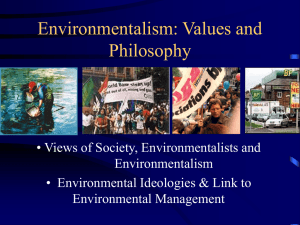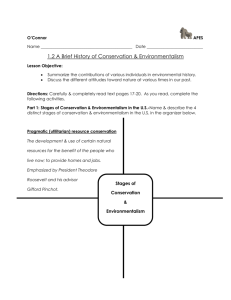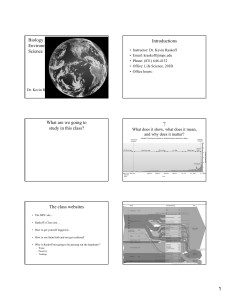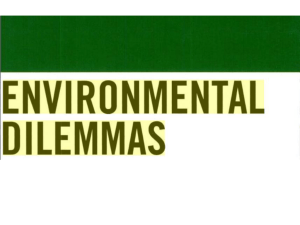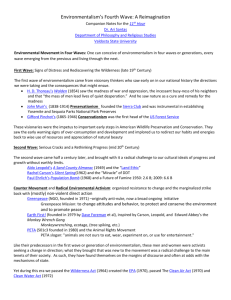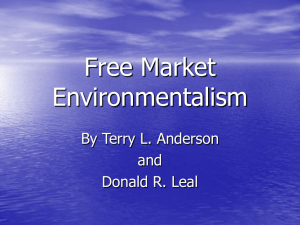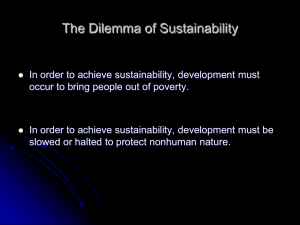What is environmentalism?
advertisement
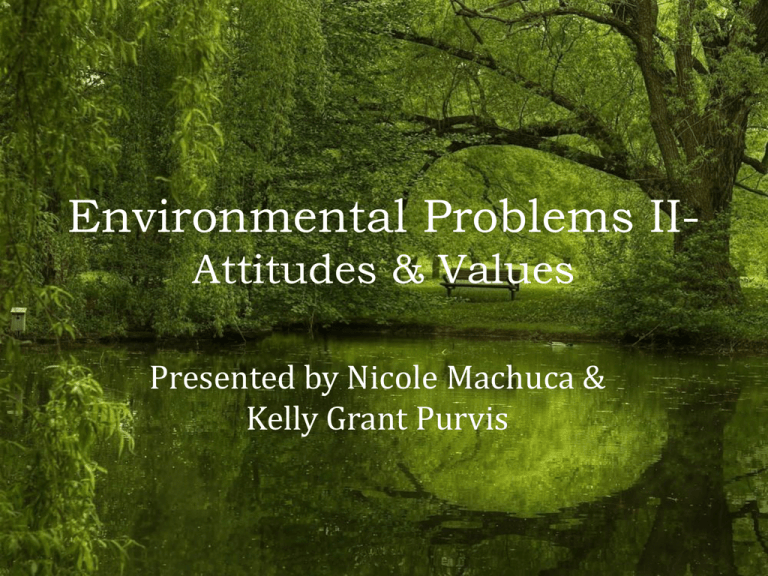
Environmental Problems IIAttitudes & Values Presented by Nicole Machuca & Kelly Grant Purvis Question: What is environmentalism? The Beginnings of Environmentalism… Andrew Light • “Conservation wave” [Romantic thought] at the beginning of the 20th century was led by Theodore Roosevelt, John Muir, Gifford Pinchot, and Aldo Leopold – Environmental groups created, like the Wilderness Society and National Park Service – Roles of these groups in ecological and park preservation and conservation began to be defined and investigated, e.g. places of solitude, moving to a “natural” state, etc. • Second wave began with Earth Day, April 22, 1970 – Greater role of government in water, air, and ecological protection and health. • 23 Acts passed, including Clean Water Act (1965) and Endangered Species Act (1973) – Environmental problem origins and solutions began to be discussed and debated. • Third wave [Beltway Environmentalism] resulted from fears of law reversal and lack of governmental support in 1980’s – Big 10 environmental groups switched from controversial issues, e.g. industry regulation, to more appealing issues, e.g. popular animal protection. The Beginnings of the Environmental Crisis… Lynn White, Jr. • ~ 1850 a “marriage” between science and technology occurred, and thus “technological power of nature” • This relationship began much earlier, e.g. water power, the mechanical clock, arms, etc. • ~ 1873 ecology entered the English language • During the last 1/3 of the 20th century concern for the state of the environment began Michael F. Maniates • ~1980’s shift in environmental responsibility from government and corporation to the individual • 1980-1990s Environmental organizations avoided government confrontation and began to support consumerbased behaviors in their messages Lingering Questions: • How has environmentalism changed over time? • Is the class’ definition similar or different to what it was over 150 years ago? • What is the role of environmentalism now to ecological conservation and preservation? Main points… White • Human changes unintentionally affect their environment • Ever since populous society humans have began to affect their environment • Christianity perpetuates the notion that man should dominate nature in Western culture • In the west, science and religion [Christianity] were once parallel – modern science is the product of that relationship • Crises results from our democratic culture, modern technology, and belief that we should dominate nature, which originates from religion • Problems can first be solved by stopping change, but this will not mend the current situation • Science and technology cannot help crisis until religion changes Main Points… Andrew Light • Environmentalism needs to change if it is going to make long lasting and integral impacts • Feelings of “place” are important to connections between community and nature • 4th wave – role of new environmentalism to connect communities to “nature” ; question wilderness and nature Dale Jamieson • Gap between US and global, environmental attitudes • An American Paradox exists – contradiction between thought and action • Facts and values are linked – Environmentalism is factbased – Different regions believe in different facts • Solutions? – US/individual needs standards of success – Creating a unified psychology Main Points… Michael F. Maniates • Current “air” of environmentalism: – The choice to make change is that of the individual, and thus nonconfrontational and apolitical, e.g. recycling, buying “green” – Individualism overshadows creativity – The best solutions are “fuzzy, mysterious, messy, and ‘idealistic’” – Corporations have mastered their ability to adapt to current environmentalism • Current fork-in-the-road: – > Easy, citizen education on individual action, privatization env. crisis, business-as-usual – > Difficult, collective citizen-action, creativity in solutions, challenges the dominant view • Recommendations – Individuals need to unite in the democratic process – IWAC (as a guide, not a direct solution) Main Points… Shellenberger & Nordhaus • The arrogance of the founding fathers of the environmental movement laid the roots of failure – Disagreement about the root causes of problems – Members of the environmental movement have become politically less powerful – As an environmental community we are hurting our own cause with a narrow vision and “group think” mentality – Also prevents alliance building and success • Current predicament (40 years in the making) – Define problem, apply technology, force the technical solution to be accepted by the masses – Our solutions lack links between the environment and technology, and other institutions, like politics & economics • Environmentalists need to… – Create a compelling vision for the future – Develop a broader scope of environmental problems – Align their interests with “core values” of greater society [which tend to be conservative] – like labor, health, religion, etc. Lingering Questions: • Is there a problem with the following model? Particularly the R for recycling? • Is government the problem or does the blame fall on the individual? • Who had the better perspective future solutions: White [religion], Light [community engagement], Maniates [shift from ind. action to community action], S&H [environmentalist], or Jamieson [paradox]? Activity Time! • Divide into 2 groups • Develop a rank-ordered list of solutions to the environmental crisis • Aim for 10 Lingering Questions… • Environmentalism is dynamic. Is there a “right” type of environmentalism or is this frequent shift healthy? • What is environmentalism missing in its current state? • “Sustainability involves a three tiered approach: environmental, social, and economic.” – Jeff. If these are components of sustainability, what will be the mechanisms of change so that the movement is successful. Or is sustainability unattainable? Lingering Questions… • If children are our future, how will we change their attitudes and values, assuming ours are already tainted? (Inspired by Lauren) • Who has the most responsibility to the environmental crisis: environmental agencies, government, children, religion individual citizens, communities, economists, or some other stakeholder? • Is it that our values as Americans are too selfish to make environmental impacts, or is it the “system” that has failed citizens? (Inspired by Adam)
